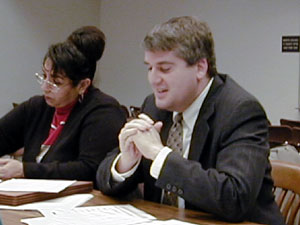|
Audio
Photos
Respond to this story
|
St. Paul rejects required Pledge of Allegiance
December 3, 2002
 |
| School board member Tom Conlon says he's disappointed his proposal was defeated but says the compromise is an important step forward. (MPR Photo/Tim Pugmire) |
St. Paul, Minn. — School board member Tom Conlon began pushing for a Pledge of Allegiance requirement more than a year ago after learning the patriotic tradition had largely disappeared from St. Paul elementary classrooms. With supportive veterans looking on Monday evening, Conlon told his board colleagues the proposal was intended to ensure students have a chance to recite the pledge if they choose.
"Some students who may wish to have the opportunity to say the pledge, their classrooms or their schools simply are not doing it. And even upon request may not be doing it. Some may not even know the words to the pledge," he said.
Schools can legally require the pledge as long as students who object are allowed to opt out. Students cannot be punished for not participating. The St. Paul school board held an often emotional public hearing on the issue last winter. The deeply divided opinions heard then are still being echoed by board members. Anne Carroll says a Pledge of Allegiance requirement would be an inappropriate intrusion into the classroom.
"When a board penetrates into what individual teachers do in individuals classrooms, that's way beyond policy to me," Carroll said.
But John Brodrick says he views the understanding of the pledge, and other rituals, as part of being an American.
"Words and these kinds of words are a very, very important part of what we're supposed to be instilling youngsters with when they spend time in our schools," said Brodrick.
Board members rejected Conlon's proposal on a 5-2 vote. Instead, they passed a motion unanimously saying they recognize the Pledge of Allegiance is a valuable part of the curriculum in district schools. They also reaffirmed existing district policy that allows site councils at each school building to decide if the pledge is recited and how often.
Final board action is scheduled later this month. Elona Street-Stewart says she has faith in school leaders making the best decision for their students.
"If, in fact, there were a group of students that really desired to say the Pledge of Allegiance, and they felt they had no chance to do that, I would trust the schools would be able to find a way for them to be able to make their recitation at whatever level or frequency that they would. And we could do that currently," she said.
Board members also agreed to send a letter to all teachers reminding them that current policy allows the pledge in classrooms. Tom Conlon says he's disappointed his proposal was defeated but says the compromise is an important step forward.
"It's progress in the right direction. Teachers now will know that there's board support for the concept of the pledge, and if that makes it more accessible to students, I think we've made some progress," according to Conlon. Conlon is also counting the state Legislature mandating the Pledge of Allegiance in all Minnesota schools. The House and Senate passed a bill earlier this year that would have had students reciting the pledge at least once a week. Gov. Ventura vetoed the measure, saying that "patriotism comes from the heart" and "is voluntary."
Sen. Mady Reiter, R-Shoreview, says she'll present an identical bill in the 2003 session. She says she expects quick action.
"I believe that once it passes out of the very powerful Senate Education Committee, that's probably where the battle will be. But I believe that once that happens the votes are in the Senate to pass it. The House certainly will not have a problem passing it. And we have a governor who has said he will sign it into law," Reiter said.
Reiter's proposal also require lessons on flag history and protocol. Her bill would allow school districts to opt out of the pledge requirement, but only after a public hearing and school board vote.
|
News Headlines
|
Related Subjects
|
